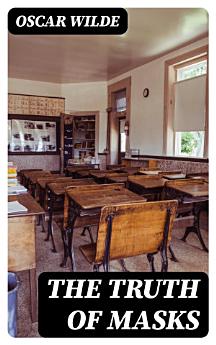The Truth of Masks
May 2022 · DigiCat
Ebook
18
Pages
family_home
Eligible
info
reportRatings and reviews aren’t verified Learn More
About this ebook
In "The Truth of Masks," Oscar Wilde delivers a profound exploration of identity and the nature of reality through a lens that combines sharp wit and incisive social commentary. Set against the backdrop of the late 19th century, a time fraught with rigid social mores and an obsession with outward appearances, Wilde's work employs a blend of philosophical discourse and theatrical flair, skillfully revealing the performative aspects of both individual and societal identities. His style is marked by eloquent prose and dazzling epigrams, weaving together themes of artifice and truth, ultimately questioning what lies beneath the masks we wear. Wilde, a leading figure of the Aesthetic Movement, was deeply influenced by his encounters with the tensions of Victorian society, which often forced individuals to conform to superficial standards. His own experiences with fame, scandal, and ostracism sharpened his insight into the human condition, particularly the complexities of personal authenticity. This understanding is manifest in his writings, capturing both the joys and despairs of navigating social facades. I highly recommend "The Truth of Masks" to readers who appreciate literature that challenges perceptions and encourages introspection about the self. Wilde's exploration of the dichotomy between reality and illusion remains relevant, ensuring that this work is not only an intellectual venture but also a crucial reflection on the masks we don every day.
About the author
Oscar Wilde, born Oscar Fingal O'Flahertie Wills Wilde on October 16, 1854 in Dublin, was an eminent Irish author, playwright, and poet, renowned for his barbed wit and flamboyant style. Wilde attended Trinity College, Dublin, and Magdalen College, Oxford, where he excelled in classics and first honed his talent for literary composition. During his time at Oxford, Wilde became involved in the aesthetic movement, advocating the philosophy of 'art for art's sake,' which would permeate his later works. Moving to London, he embarked on a career as a writer, rapidly establishing himself with plays such as 'The Importance of Being Earnest' and 'An Ideal Husband'. His only novel, 'The Picture of Dorian Gray', stands out as a classic of Victorian literature and is praised for its exploration of morality, hedonism, and the duality of human nature. Wilde's literary contributions are not limited to plays and a novel; he was also a prolific essayist. One of his lesser-known works, 'The Truth of Masks'—a collection of essays—illuminates his views on the philosophical and aesthetic aspects of theatre. In these essays, Wilde explores the critical role of costume in Shakespearean drama, emphasizing the interdependence of text and spectacle. This collection is testament to Wilde's belief that surface and symbol are critical to understanding deeper truths. His life, as tumultuous as his writing was brilliant, met a tragic downturn after his imprisonment for 'gross indecency.' Nevertheless, Wilde remains an iconic figure in literature, with his works continuing to be studied for their literary merits and their author's intriguing life story.
Rate this ebook
Tell us what you think.
Reading information
Smartphones and tablets
Install the Google Play Books app for Android and iPad/iPhone. It syncs automatically with your account and allows you to read online or offline wherever you are.
Laptops and computers
You can listen to audiobooks purchased on Google Play using your computer's web browser.
eReaders and other devices
To read on e-ink devices like Kobo eReaders, you'll need to download a file and transfer it to your device. Follow the detailed Help Center instructions to transfer the files to supported eReaders.







